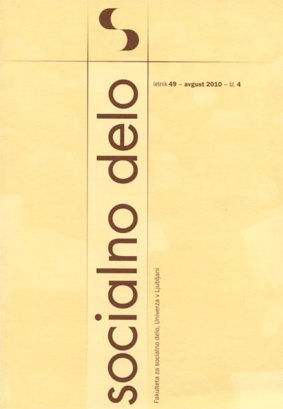
Revija Socialno delo
Socialno delo Journal is the only scientific periodical publication for social work in Slovenia. It's been published since 1961. From 2019, the journal adheres to open access format. Four issues are published per year: 1 (Jan-Mar), 2 (Apr-Jun), 3 (Jul-Sep), 4 (Oct-Dec). Abstracts are included in data bases: ERIH PLUS, International Bibliography of the Social Sciences IBSS), and EBSCO SocIndex with Full Text. The journal is published by Faculty of Social Work, University of Ljubljana. Journal is so-financed by Slovenian Research Agency (ARRS). Texts published in Socialno delo Journal are licenced under Creative Commons licence: CC BY-SA
ISSN 0352-7956
year 62, No.4
SCIENTIFIC ARTICLES
Srečo Dragoš
Decommodification of work - Pg. 241 - 258Keywords: welfare state, work, precariat, commodification, bullshit jobs, universal basic incomeThe welfare state, the greatest social science innovation of the 20th century, has been the target of much criticism over the last 50 years. Some of them are justified, others not at all. The legitimate criticisms have been mainly concerned with the performance of the welfare state, i.e. the lack of realisation of some of the objectives for which it was conceived in the first place, such as eradication of poverty, precariat, regulation of invisible labour, scope and quality of public services. Unjustified criticisms focus on the effectiveness of the welfare state, questioning its legitimacy and even accusing it of having morally negative effects on citizens, such as on the stateless recipients of welfare. Since the distance between one type of criticism and the other is by no means diminishing, it seems that the range of rational arguments and empirical data is rather limited, and that is why more and more emphasis is being placed on possible alternatives to the welfare state. This paper presents ten alternative concepts, but before that, it deals with one of the basic problems that is least discussed, although it should serve as one of the criteria for assessing the alternatives discussed, namely the (un)meaningfulness of work.
Gordana Horvat
The importance of formal and informal support networks for foster parents in establishing the normalisation of children's life: the case of Croatia - Pg. 259 - 274Keywords: foster care, childcare, families, deinstitutionalisation, social work, social work centresFoster care has become the focus of social work in Croatia in recent years, due to the lack of placement capacity in institutions and process of deinstitutionalisation which aims to achieve normalisation of human life in the community. In foster care, the normalisation of a child's life is a challenge for all those involved in the process, as there is no inclusive model of foster care in Croatia and the role of social work is divided between all actors in the foster care process. Therefore, the thesis is put forward that for the establishment of the normalisation of the life of a foster child, it is important to provide formal and informal networks in the community, which are built and connected by social work in joint collaboration. The purpose of this paper is to identify the current support network for foster care, determine the needs of foster parents for normalizing the life of a child in foster care, and examine how social work as a profession contributes to this process. Through a qualitative analysis of eight semi-structured interviews with foster families conducted between November 2021 and January 2022, the findings indicate that foster parents need more accessible ongoing institutional support from social workers, but also non-formal forms of support, particularly associations of foster parents in the civil sector and better collaboration with children's primary families.
Petar Šajfar
Experience of deinstitutionalisation from service users' perspective in Croatia - Pg. 275 - 295Keywords: intellectual disability, relocation, community-based support, group homes, long-term careAs in other post-socialist countries, the process of deinstitutionalisation in Croatia began much later than in Western countries. A turning point is the year 2014, when the mass relocations of people with intellectual disabilities from long-term institutions to community-based settings began. The focus of this research is on the experiences of deinstitutionalisation from the perspective of service users. The research methodology is based on a qualitative approach because it enables a deeper understanding of the problem and allows the researcher to focus on real life experience of respondents. The sample included 27 participants (14 males, 13 females) who during the research lived in 11 different group homes in different parts of the Republic of Croatia. Based on thematic analyse, the results show that the majority of respondents had to move from a long-term institution to a group home due to necessity when long-term institutions were closed. The criteria by which someone was selected or excluded for admission to the deinstitutionalisation process was his or her functionality (e.g. good behaviour, physical mobility). Finally, the research shows that most participants were not systematically and purposefully prepared for the transition from a long-term institution to a group home. Findings of the study are partly in line with the international literature, highlighting the marginal role and difficulties of service users in the deinstitutionalisation process.
PROFESSIONAL ARTICLE
Blaž Mesec
Linguistic model of ChatGPT artificial intelligence as a tool in qualitative analysis - Pg. 297 - 316Keywords: human intelligence, heuristics, grounded theory, methodology, mentorship, study practicumThe text describes an experiment that used the language model of artificial intelligence called ChatGPT for the qualitative analysis of a response from a social work student to an interview question about her study practice. ChatGPT was asked questions about identifying basic themes, concepts, typologies, and evaluations. The robot provided surprisingly appropriate answers, but it rejected self-critically the request for professional conceptualization. The conclusion of the informal experiment is that ChatGPT is a useful tool in qualitative analysis, provided that the researcher can ask appropriate questions (prompts). However, the output of the robot must be evaluated and supplemented by a human researcher before final report and publication. The issue of authorship and responsibility is raised.
